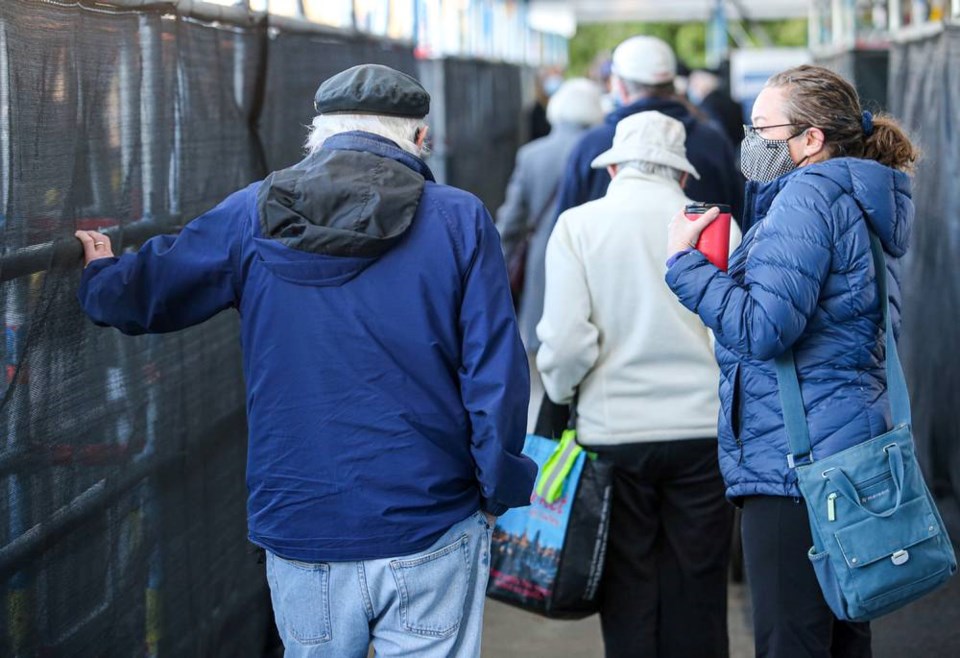Now that we have decided who is first in line for the vaccine, just one question remains: Who should go last?
That is, after months of jockeying by employee groups trying to position themselves near the front — really, it was like the sausage-sample queue at Costco — we learned Thursday who would get priority. The province identified more than 300,000 workers who will receive the inoculation equivalent of the Disneyland fast pass: first responders, K-12 school staff, child care workers, grocery store employees, posties, bylaw and quarantine officers, manufacturing workers, wholesale/warehousing employees, cross-border transport workers, prison staff, and people who live squeezed together in places such as ski hills.
Fair enough. A solid argument can be made that all those workers are either vital enough or vulnerable enough to warrant bumping them ahead of their age groups.
But if that’s the case, the reverse should be true, too. There must be certain people who should be shunted not to the front of the line, but the back.
My nominees:
• Telemarketers who call at supper
• Social media influencers
• Street mimes
• The 2011 Boston Bruins
• Anybody caught at a party during the pandemic
• Abusive anti-maskers
• People who wear masks, but under their chins
• That one guy who insists on standing really close while he talks to you, even though you’re leaning backward to avoid his COVID breath
• Me
Really, as much as it hurts to say so, I can think of no reason on God’s green earth why I should roll up my sleeve before anyone else. As many readers eagerly point out, I am relatively useless.
This was impressed upon me a few years ago when I happened to be in Kamloops just as the city filled up with thousands of refugees fleeing the forest fires that raged across the Interior that summer. Might as well pitch in with the relief efforts, I thought, and toddled down to refugee central to volunteer (fitting myself with an imaginary halo en route).
Alas, upon presenting myself to the volunteer tent I was told thanks but no thanks, they already had all the helpers they needed, or at least all the helpers whose skills were limited to A) typing slowly and B) missing deadlines. Did I have medical training? No. Drive heavy equipment? No. Cook for the masses? No. Don’t call us, we’ll call you.
As you might expect, this was a tad humbling. It’s disconcerting to try to fly to the rescue, only to discover that you are not so much Superman as superfluous. It’s unnerving to realize you are not as indispensable as you think, that when the next Great Flood arrives and they’re deciding who gets to board the ark, you’ll be left dogpaddling in the wake with the performance artists and search engine optimization specialists, watching the farmers and physicians sail away.
The past year has, in fact, altered the way many occupations are viewed. According to jobs website careercast.com, the shipping and transportation industries have become more valued. Behind-the-scenes logisticians who ensure orders are filled have become more essential. Ditto for the network and systems administrators who make it possible to work from home, and the information security analysts who make online conversations and transactions safe. Health care workers, much admired, are expected to remain in demand in the post-pandemic world.
What else qualifies as a good path to follow? Careercast.com periodically produces the Jobs Rated Report, which ranks vocations based on income, employment outlook, physical demands, stress and working environment. The most recent index, in 2019, declared the top five jobs to be, in order, data scientist, statistician, university professor, occupational therapist and genetic counselor.
Newspaper reporter, on the other hand, was found all the way down in 222nd place, third from the bottom. For real. The only lower-ranking jobs were logger and, in last place, taxi driver. And here I was thinking I was having a good time
But I digress. We’re supposed to be talking about who should be the caboose on the vaccine train.
Or maybe I should just be grateful to be getting a vaccine that we initially were told wouldn’t come for two years, and that should now be in all our arms by July 1, well ahead of schedule.
jknox@timescolonist.com



